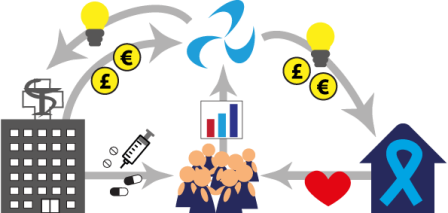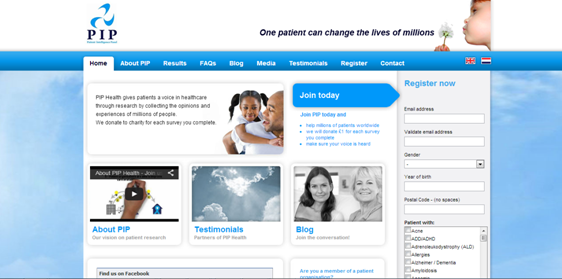PIP Health – Pipping Others to the Post
We spoke to Nadine van Dongen about patient intelligence in the pharma industry, and how it can help patients have a voice.

Nadine van Dongen, Founder and Managing Director of PIP (Patient Intelligence Panel) Health, spotted a gap in the market and used her extraordinary passion to create a patient research company that gives patients the voice they have been waiting for. Her aim is to improve the quality of life of millions of patients by allowing them to share their experiences in efforts to make healthcare organizations more ‘Patient Intelligent.’
Currently, the PIP Health platform has thousands of European patients who complete health-related questionnaires online. Headquartered in London, PIP Health works with patient advocacy organizations in the UK in order to make the voices of patients heard. Collaborations include Diabetes UK, Women’s Health Concern, and the National Rheumatic Arthritis Care Society, to name but a few.
Life-changing catalyst
It was a life-changing accident that was the catalyst to van Dongen’s deep understanding of the need for a louder patient voice. She explains, “August 27th 2015 will be the 10 year anniversary of my life-changing accident on the motorway in the Netherlands, which caused my car to roll over three times. This resulted in two broken vertebrae, two collapsed lungs and a litany of other injuries… plus the motivation to start a company to give patients a voice. I was very lucky for just when the accident occurred, an empty ambulance happened to drive past. They saved my life. I was in a coma for two weeks and initially it was unclear whether I would survive. When I came to, the doctors considered it a miracle that I could still move my legs.”
Doctors expressed concern that her left arm would need to be amputated, but van Dongen says, “Two scars are the only visible reminder of the accident. However, the nerves in my arm had been severely damaged which made the rehabilitation difficult. I had excruciating nerve pains that paralyzed me 24 hours a day. The drugs I took barely worked. Before the accident, I worked for a pharmaceutical company in the Netherlands, Servier. With the help of my colleagues who frantically started looking for new nerve pain drugs at other pharmaceutical companies, I was able to seek a second opinion get more effective drugs and treatment.”
Giving patients a voice
Van Dongen explains that this was when she realized that not all patients are as privileged to have the connections she had in the pharmaceutical industry in order to source the drugs that would give her some pain relief. Van Dongen says, “Patients often don’t have a voice. Hospitals, pharmacies, government agencies and last but not least, pharmaceutical companies, all want to help patients.” However, it is hard for them to really understand what a person is going through during a time of trauma or after being diagnosed with a chronic disease, even with the help of qualified and competent professionals. They need to listen to the patient and what the patient says they need – not what a healthcare professional has decided they need. Van Dongen realized that “This could be a business plan with a true altruistic heart. And now, 10 years later, PIP Health and the concept ‘Patient Intelligence’ have proven that I was right.”
Patient intelligence refers to recognizing and taking into account the pivotal role of patient behavior and patient intention, which organizations need to assess in order to optimize healthcare management across all disease types, whether long or short-term and across all injuries.

PIP Health’s mission ties in with the drive towards patient-centricity in healthcare. While pharma companies are bound by various government regulations concerning interactions with patients, PIP Health is a free agent. There is no cost for patients to register with PIP Health and their site makes it easy to register as the patient can enter details on any page of the website. This is especially useful for those in pain, or older people who can find navigating multiple pages an effort – think of arthritic fingers, poor eyesight and short concentration spans.
Once their details are entered, it’s just a click on the orange button and the patients are registered and can have their say. As van Dongen says, “We give patients a voice through research and for each questionnaire they fill in, we donate money to a charity the patient has chosen. This is funded by our clients.”
Pharma using PIP Health to learn more about patients
Asked about the clients who fund the questionnaires, van Dongen says PIP Health has a particularly good working relationship with a number of companies. “Companies that have worked on Patient Intelligence projects with us are AbbVie, Ferring, Genzyme, Grunenthal, Janssen, Merck, Mundipharma, Roche, Servier and Teva. Also, agencies that work for pharmaceutical companies come to us to test messaging and patient support program design, etc.”
“Pharmaceutical companies (and other organizations in healthcare like communication agencies) can come to us when they want to learn more about their patients,” continues van Dongen. “Alternatively, we go to them to convince them they need to listen to patients. We are able to accommodate patients suffering from over 150 different ailments and diseases. From mental health problems, through to cancer, growth hormone deficiency and cardiovascular problems - we have a proven track record in providing excellent fieldwork for pharma’s healthcare related researchers. These aid in improving quality in healthcare through research and communication,” she explains.
Surveys providing key insights
For far too long, patients have been complaining that no one listens to them. They can often feel like they are guinea pigs, being shunted from one medication to another without anyone hearing their concerns. And who best to know what works for them than the patient? They know how they feel. They also know what medication makes them feel better, and which ones make it hard for them to perform adequately at work.
It is the power of large numbers that makes the data useful for all stakeholders in the healthcare environment. A study on bipolar disorder was completed within two days by 300 PIP Health members.”
At a time when pharma companies want to become more involved in social media but are being cautious because of regulations and legalities that hamper online interactions and make social media interactions rife with possibilities for lawsuits, PIP Health is right on target with Patient Intelligence.
PIP Health has large groups of people who fill out surveys online, and therefore they have readily available quantitative research data that can be used by pharmaceutical companies and government agencies. As van Dongen notes, “It is the power of large numbers that makes the data useful for all stakeholders in the healthcare environment. A study on bipolar disorder was completed within two days by 300 PIP Health members.”

The goal of PIP Health isn’t to provide patient contact details to pharma companies looking for participants in clinical trails. Van Dongen is quite clear on this issue, stating, “Sometimes we end a survey with a request as to whether the patients would be interested in participating in a clinical trial, but that is never the main purpose.”
Asked whether pharma companies have contacted PIP Health with regard to patient input on the design of clinical trials, van Dongen says this hasn’t yet occurred, “But we do research with R&D departments on quality of life and, therefore, patients will indirectly have a say in clinical trial design.” What PIP Health has embarked on is patient segmentation projects, which identify ways to best help patients.
Patient-centricity through patient segmentation
The aim of patient segmentation goes deeper than developing different messages for different segments; it entails designing different planning for resources, care arrangements, and service delivery, ensuring that each person's health needs can be met effectively and efficiently.
Patient segmentation, particularly for those with chronic conditions, involves grouping patients according to their reaction to their condition – for example, tolerators, evaders, fighters, and cynics. This aids in developing strategies to enable patients to better cope with what affects them and can lead to an improvement in outcomes.
Van Dongen explains that, “The aim of patient segmentation goes deeper than developing different messages for different segments; it entails designing different planning for resources, care arrangements, and service delivery, ensuring that each person's health needs can be met effectively and efficiently.”
How a patient reacts to their diagnosis influences the development of suitable and effective ways to approach their treatment. PIP Health embarked on addressing this important aspect through a patient segmentation project in 2014 for both Multiple Sclerosis (MS) and Chronic Obstructive Pulmonary Disease patients. Enhancing quality of life and a positive care experience for people diagnosed with long-term conditions can only be tackled once the patient population is divided into different behavioral groups based on whether or not they perceive themselves as coping with their disease and whether or not they are actively seeking changes in their condition or treatment.These psychological factors provide important information on how best to manage the conditions of both chronically ill patients as well as those with a short term illness or injury.
A truly engaging framework
PIP Health has multiple testimonials from patient advocacy groups that support their work. The Cure Parkinson's Trust (CPT), which was founded by patients themselves, is passionate about involving people living with Parkinson's in its vision. Their approach reflects PIP Health’s vision of, “Enabling people to make change happen, by joining together to create a shared voice through research,” says van Dongen. “The CPT and PIP will focus on working on quality of life research to indicate the extent to which Parkinson's disease is affecting key aspects in life,” she adds.
Van Dongen continues to drive her passion forward. She says, “We did a study with 489 chronically ill patients in the UK about what they expect from pharma companies, and 89% of the patients want pharmaceutical companies to help them understand their condition. More than two thirds (70%) think that pharmaceutical companies should provide solutions to help people take their medicines. They then want to review and test the solutions in order to be involved in decision-making.”
For PIP Health, it comes down to listening to what patients want; for patients to know that someone is interested in what they are going through and who will use that knowledge to find solutions to enable them to live a better quality life, all the while keeping them involved in the process – a truly engaging framework for promoting patient-centric healthcare.
